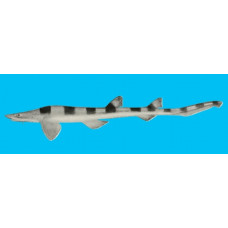Latin name
Cirrhoscyllium expolitum
Other name
Cirrhoscyllium expolitum
Identification
Sharks have a slender, elongated body and a long, slightly pointed snout. The throat has characteristic antennae. Their mouths are located in front of the eyes, there are narrow nasal furrows, and the nostrils are surrounded by grooves and folds. The oval eyes are horizontally elongated. There are tiny spiracles behind the eyes. The gill slits are small. The nostrils are framed by short pointed antennae, the outer edge of the entrance opening and surrounded by folds and grooves. The small mouth is located at the tip of the snout.
Features of fish fins
The base of the first dorsal fin is located behind the free tip of the pelvic fins. The dorsal fins are equal in size. Pectoral fins are large, broad and rounded. The anal fin is smaller than the second dorsal fin. The asymmetrical upper lobe of the caudal fin is not elevated above the axis of the body and has a ventral notch on its edge. The lower lobe is not developed. Dorsal spines (total): 0; Dorsal soft rays (total): 0; Anal spines: 0; Anal soft rays: 0.
Fish colouring
The body, tail and caudal fin of the fish are covered with 10 dark saddle marks.
Distribution
They inhabit the northwestern Pacific Ocean in the South China Sea, off the coasts of China, Japan, the Philippines, and Vietnam.
Habitat
Marine bottom species. They occur near the bottom at the outer edge of the continental shelf, at depths down to 190 m.
Size
The maximum registered size is 33.5 cm.
Behavior
Their lifestyle is poorly understood. It is only known that these rare predators are solitary and more active at night.
Food and feeding habits
The diet of these sharks is unknown.
Reproduction
These sharks probably reproduce by laying eggs. The two known mature females are 30.6 and 33.5 cm long.
Fishing
These sharks are not caught commercially. They are likely caught as bycatch in fishing nets. Sharks that are caught are likely thrown overboard.
Relationship with a person
Potentially hazardous to humans.
| Classification | |
| Phylum | Chordata |
| Class | Chondrichthyes |
| Squad | Orectolobiformes |
| Family | Parascylliidae |
| Genus | Cirrhoscyllium |
| Species | C. expolitum |
| Features | |
| Conservation status | Data Deficient |
| Habitat | Bottom |
| Life span, years | No information |
| Maximum body weight, kg | No information |
| Maximum length, cm | 33,5 |
| Sailing speed, m/s | No information |
| Threat to people | Edible |
| Way of eating | Predator |
Barbelthroat carpetshark
Tags: barbelthroat carpetshark

